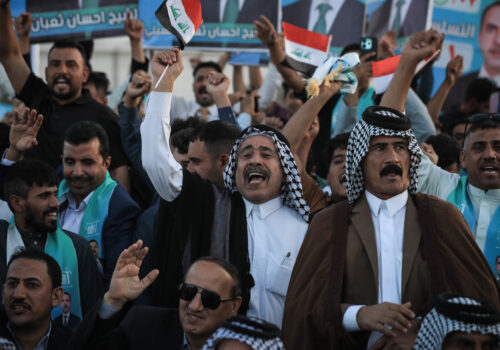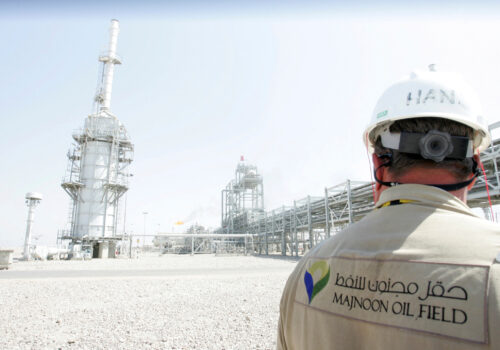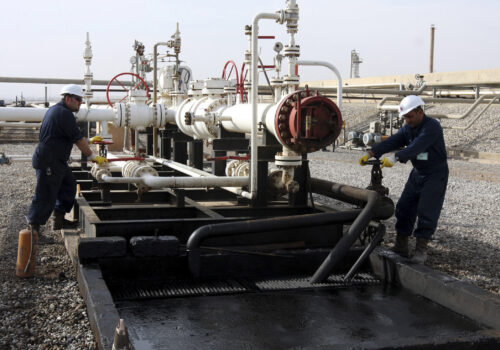Why China is here to stay in Iraq’s energy sector
Even as Iraqi Prime Minister Mohammed Shia al-Sudani has worked to increase US involvement in Iraq’s energy sector, his government has also expanded already-deep ties with Beijing by awarding new upstream projects to Chinese companies and increasing the scope of critical energy infrastructure projects financed by China.
China was already the biggest international player in Iraq’s upstream sector—operating several large oil fields across southern Iraq—before Chinese companies were awarded new oil and gas blocks under al-Sudani’s premiership. The only oil and gas contract auction held during al-Sudani’s administration—the May 2024 “Fifth+ and Sixth” licensing round—was dominated by a combination of Chinese national oil companies and privately held Chinese exploration and production (E&P) companies. Interest from large Western oil companies (supermajors) was tepid (only Shell placed a bid, and it was unsuccessful), and interest from US companies was virtually nonexistent. Beijing’s dominance of the bid round was so complete that the only non-Chinese company to land an asset was an Iraqi firm, KAR Group.
Chinese financing has also appeared to give Chinese companies an inside track to winning critical energy infrastructure projects. Under a program that was initiated well before al-Sudani’s government, in 2019, Iraq now directs about 150,000 barrels per day worth of oil revenues into an escrow account, which then functions as collateral to unlock loans via the state-owned firm Sinosure. In its early days, this vehicle was used to fund projects outside of the energy sector, but al-Sudani’s government has recently leveraged the Chinese financing program to push forward two pieces of critical energy-sector infrastructure:
- A $2.6 billion pipeline project to bring treated seawater to giant oil fields for water injection, awarded to the China Petroleum Engineering and Construction Corporation
- A one-billion-dollar gas pipeline project linking an Anbar province gas field to power generation facilities, some of which are also built by Chinese companies.
Chinese financing is also likely to make or break an $18 billion integrated project that was awarded earlier this year to China’s Geo-Jade Petroleum for the upstream development of the Tuba oil field in the Iraqi city of Basra and the construction of an oil refinery, two power plants, a petrochemical plant, and a fertilizer plant.
China’s appeal to Iraq is obvious. On the upstream side, Chinese companies will accept commercial terms that Western majors and US E&Ps simply will not. Indeed, China’s success in Iraq’s 2024 oil and gas contract auction was less a function of any deliberate Iraqi strategy to favor Chinese companies than it was a reflection of the structure of the auction, in which the sole criterion for deciding a winning bid was a company’s willingness to accept a narrow profit margin. This structure put Chinese companies at an advantage, because vertically integrated Chinese national oil companies can make money on projects by assigning major contracting opportunities to their subsidiary entities. At the same time, small Chinese E&Ps can operate at a lower cost than their Western counterparts. Chinese companies can also access state financing with relative ease since Beijing sees a strong presence in Iraq’s upstream sector as a strategic priority for securing long-term crude supply.
Supermajors and US E&Ps have also found al-Sudani’s government eager to do business, even as these companies cannot compete with Chinese firms in open bid rounds. Al-Sudani’s administration inked major contracts with both TotalEnergies and BP after bilateral negotiations, and it is holding ongoing talks with both Chevron and ExxonMobil. Sudani’s government has also signed a memorandum of understanding with the privately owned US E&P company HKN Energy.
Al-Sudani’s government appears to see significant strategic value in courting supermajors and US E&Ps, even if the terms these companies demand are less advantageous for Iraq than those accepted by Chinese companies. Successive Iraqi governments have long been wary of creeping Chinese consolidation over Iraq’s upstream sector. For example, Iraq’s former oil minister, Ihsan Ismaael, told the Iraq Oil Report in 2021 that he rejected an effort by Lukoil to pursue an asset sale at West Qurna-2 to a Chinese company, because, “we need to keep the same balance of market share in the south.”
Additionally, a range of oil officials have told the authors that Iraqi oil officials often voice a preference for the technology and approach of supermajors. Meanwhile, increased US investment in Iraq’s energy sector is perceived by policymakers in Baghdad—based on our research and conversations with key leaders speaking on background—as a tool for mitigating the risk of sanctions enforcement against Iraqi entities by the US Treasury Department.
With Iraqi parliamentary elections looming, US and Chinese companies alike will be engaging a new government at some point in 2026. Even if there is a new prime minister at the helm, the next Iraqi government’s policy toward international energy investment is likely to be shaped by the same forces that have informed al-Sudani’s approach. Regardless of the specific makeup of the next Iraqi government, it is likely that Chinese firms will continue to enjoy an advantage—stemming from Iraq’s desire for favorable commercial terms and the relative ease of access to Chinese financing. At the same time, Iraq is also likely to continue soliciting megaprojects with supermajors due to their technical capacity and potential geopolitical value.
Jared Levy is the director of the Iraq Oil Report‘s research services division. He oversees a team of data collectors and analysts that provide private sector and government clients with a range of subscription products and bespoke research and briefing services. He previously ran the Iraq office of a market entry advisory company.
Ben Van Heuvelen is the editor-in-chief of the Iraq Oil Report. His work has also been published in the Washington Post, Bloomberg, the Atlantic, and Foreign Policy. He regularly briefs investors, diplomats, governments, and nongovernmental organizations on Iraq’s political and business environment. He previously worked as a research fellow at the New America Foundation in Washington, DC.
Further reading
Tue, Nov 4, 2025
Twelve questions (and expert answers) on the Iraq elections
MENASource By
Iraq is set to hold elections on November 11. Our experts unpack the key questions looming over the landmark vote.
Tue, Oct 28, 2025
US energy firms are returning to Iraq—but politics could undo their fortunes
MENASource By
Al-Sudani's rush to sign deals with US firms over the past few months is fundamentally about political survival, both his own and Iraq’s.
Tue, Sep 30, 2025
Is the Baghdad-Erbil oil deal a blueprint for settlement—or a stopgap?
MENASource By Victoria J. Taylor , Yerevan Saeed
Whether the oil deal will be a tactical stopgap or a step towards permanent settlement will become known after the Iraq's elections and the year's end.
Image: An aerial view of an oil drilling rig at the al-Ahdab oil field in Wasit province September 23, 2011. Chinese company, the China National Petroleum Corporation has begun operations at the Al-Ahdab oil field in Iraq, according to news reports. Picture taken September 23, 2011. REUTERS/Mohammed Ameen (IRAQ - Tags: POLITICS ENERGY BUSINESS)



